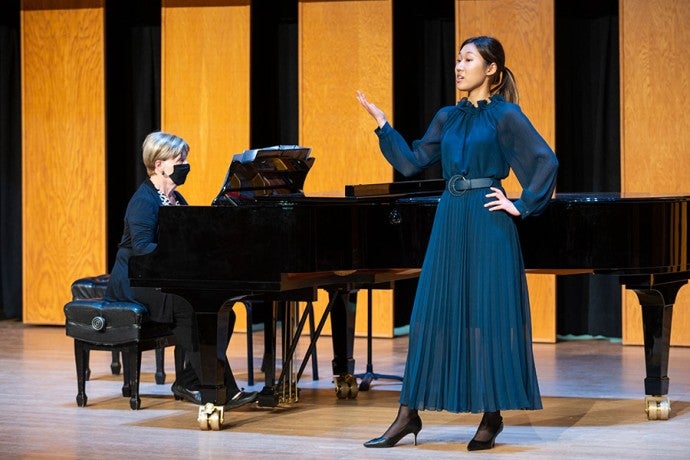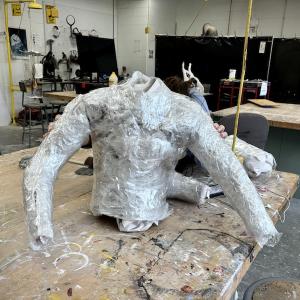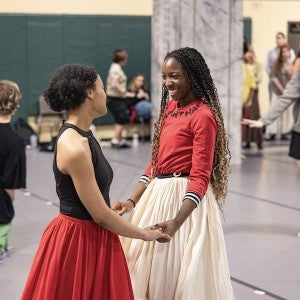Applications are still open for Arts Camp and Arts Academy. Programs fill quickly—submit your app today!
The Interlochen Advantage: Admission tips from the University of Michigan School of Music, Theatre, and Dance
Associate Director of Admissions Brian Igoe discusses how attending an arts boarding school can help you prepare for college and shares what admission representatives want you to know about the application and audition process.

As the college admission process becomes more and more competitive, it’s easy to get lost in the crowd.
To help you navigate this exciting yet nerve-wracking season, we sat down with Brian Igoe, the Associate Director of Admissions at the University of Michigan School of Music, Theatre, and Dance. Below, Igoe gives you a behind-the-scenes glimpse into what colleges are looking for, what you can do to be a stronger applicant, and what admission representatives wish you knew about the admissions process.
What are some of the things that the University of Michigan School of Music, Theatre, and Dance looks for in a prospective student?
We look for students who will thrive in a university environment. All of our students take at least one-quarter of their courses outside of the performing arts, so we tend to seek out students who are looking for that type of college experience.
We also look for students who will be good colleagues and collaborators. Our school prides itself on the strong bonds our students form with their peers. Rather than being an intensely competitive environment where students are always looking over their shoulder, we want to be a community where mutual support fosters artistic growth.
Finally, our faculty look for students who have the potential to grow. You are not a finished product—if you were, you wouldn’t need to go to college! Don’t feel like you need to be at the level of a college graduate in order to be a competitive college applicant.
From an admissions perspective, what are the advantages of attending a dedicated arts boarding school?
The main advantage comes simply from being surrounded by fellow young artists who are intensely dedicated to the arts. I think everyone who has participated in the performing arts understands how much you can learn from the people around you. Being in an environment where everyone is similarly invested in the arts is a really positive experience that will help push you towards your full potential.
What sort of weight does participation in a program like Interlochen Arts Camp or Arts Academy carry on a college application?
We have had many former Camp or Academy students come to the School of Music, Theatre, and Dance—we love seeing Interlochen on an applicant’s transcript or résumé! Interlochen students tend to be very well prepared for the college application and audition process: they’ve had great training from Interlochen faculty as well as access to guest artists. Academy students also get really great support from the Interlochen counseling staff throughout the college application and process, which I think is invaluable.
What are some things that freshmen and sophomores can do to be a stronger applicant come junior/senior year?
The most important thing you can do is to keep working hard in the classroom to set yourself up for success in the academic review part of your application. Beyond that, maximize the opportunities for artistic training that are available to you and seek out people who can help you grow.
You are not the artist now that you will be by the time you are applying for schools, so now is not the time to choose your audition repertoire. This is the time to explore, to grow, and to find out what you are good at by working with trusted instructors who know you well.
What can students do to ensure the best possible audition experience?
The first key to a great audition is playing to your strengths. When selecting audition repertoire, choose pieces that you can perform well and to which you feel a strong connection. The audition is not a time to stretch your capabilities; it’s the moment to showcase the very best version of yourself.
The second key is preparation. Going into an audition room is an inherently stressful activity, even for seasoned professionals. The more you prepare, the better you will be at managing your nerves. Preparation includes not only perfecting your audition repertoire, but also doing little things like practicing your audition in different-sized rooms or rehearsing in the clothes and shoes that you plan to wear for your audition. It may seem a little silly at first, but it will help you feel much more comfortable on your audition day.
What do you wish more students knew or understood about the application and audition process?
The big thing we want students to know is that everyone—from the admissions office staff to the school faculty—wants you to succeed. Though you are expected to understand and complete the application process on time, the admissions office is here to help you through that process by answering your questions and clarifying anything that you find confusing.
From the faculty’s perspective, they understand that you’re in a stressful position, and they realize that your audition may not be perfect. I remember sitting in on an audition once where an applicant had to start their song three times because they gave the faculty accompanist the wrong tempo due to their nerves. However, because they were otherwise well prepared, they were admitted to the program. I’m sure that student thought there was no way they would get in, but you never know. Do your best, and let us figure out the rest.
Responses have been edited for length and clarity.





